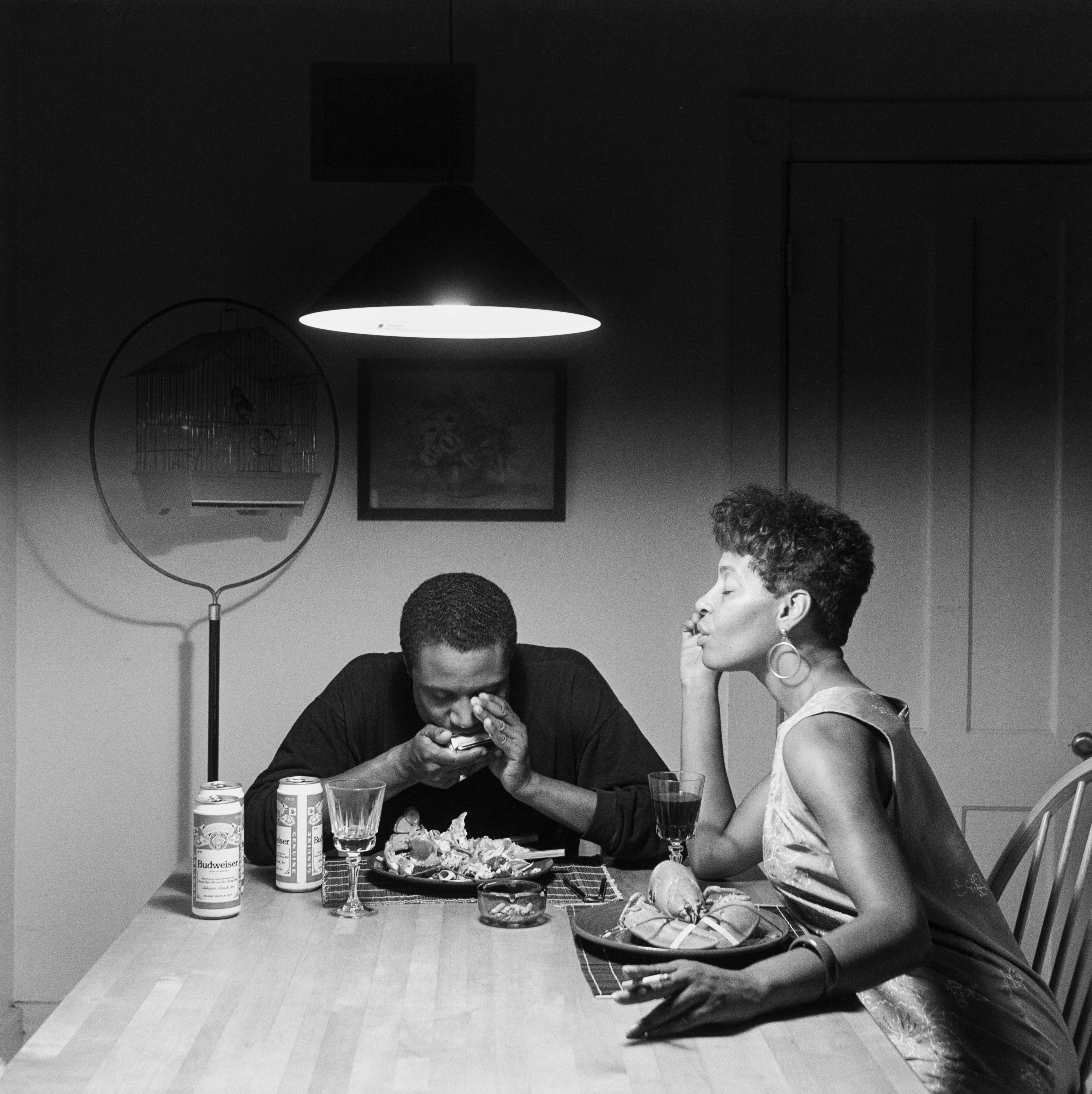
Every month, hundreds of galleries showcase new exhibitions on the Artnet Gallery Network—and every week, we shine a spotlight on the exhibitions we think you should see. Check out what we have in store, and inquire more with one simple click.
What You Need to Know: For over four decades, American artist Carrie Mae Weems has created striking photographic works that draw out the intersections between performance, identity, Blackness, American history, and power. “Witness,” which opens at Fraenkel Gallery on Thursday, September 9, traces an arc through Weems’s most influential series, presenting now-iconic images from her “The Kitchen Table Series,” “American Monuments,” and “From Here I Saw What Happened and I Cried” series, among others. The survey marks Weems’s inaugural exhibition with Fraenkel Gallery and coincides with the gallery’s recently announced representation of the artist.
Why We Like It: The exhibition serves as a reminder of the powerful impact of performance and its relationship with photography; though stylistically distinct, throughout her different series, Weems casts herself, and her subjects, as performers occupying changing roles and backdrops, all of which quietly prod at questions of identity and its relationship to history. In perhaps her most famous body of work, “The Kitchen Table Series” Weems stages herself in a fictive narrative world revolving around the intimate space of the kitchen table, appearing to viewers in guises of mother, friend, lover, and much in-between.
Her photograph Untitled (Playing harmonica) (1990), on view in the exhibition, depicts a couple in a moment of revelry, him playing his harmonica, her smoking a cigarette. The image is specific and transcendent at once; it could be a still from a famous film or a family photo album.
Elsewhere, political acuity marks her work more overtly; photographs on view from her three series “Museums,” “American Monuments,” and “Roaming” picture Weems, a Black woman, dressed in all-black and turned away from the camera as she stands in front of grandly scaled institutions. These images feel particularly prescient in lieu of the reckoning around monuments of the past year and a half. Overall, the Fraenkel exhibition is an evocative reminder of just how quietly profound—and enduring—Weems’s practice really is.
What the Gallery Says: “Weems has often used performance marked by highly constructed artifice to explore how history is remembered and created. In Constructing History, Weems worked with college students to re-enact moments of social upheaval from the 1960s, building stage-like photographic tableaux. In the video People of a Darker Hue, Weems addresses more recent history, pairing footage of buoyant city life and solemn protest with a stark, highly stylized vision of oppression, in commemoration of Black men and women killed by police. In From Here I Saw What Happened and I Cried, one of Weems’s best known and most powerful series, photographs of enslaved men and women and other Black subjects, collected from museum and university archives and other sources, are tinted red and overlaid with heartbreaking and poetic texts. Using important images in American photography to explore not only race but rather race through the lens of American photographic history, the series takes on both photography and the racist structures it has supported.”
See works from “Carrie Mae Weems: Witness” below.
Carrie Mae Weems
You Became Mammie, Mama, Mother, Then, Yes, Confidant-Ha/
Descending the Throne You Became Foot Soldier & Cook (1995–96)
Inquire for More Information
Carrie Mae Weems, You Became Mammie, Mama, Mother, Then, Yes, Confidant-Ha/ Descending the Throne You Became Foot Soldier & Cook (1995–96). Courtesy of the artist and Jack Shainman Gallery, New York.
Carrie Mae Weems
Mahalia (2010)
Inquire for More Information
Carrie Mae Weems, Mahalia (2010). Courtesy of the artist and Jack Shainman Gallery, New York.
Carrie Mae Weems
American Monuments I (2015–16)
Inquire for More Information
Carrie Mae Weems, American Monuments I (2015–16). Courtesy of the artist and Jack Shainman Gallery, New York.
“Carrie Mae Weems: Witness” is on view at Fraenkel Gallery, San Francisco, September 9 – October 23, 2021.